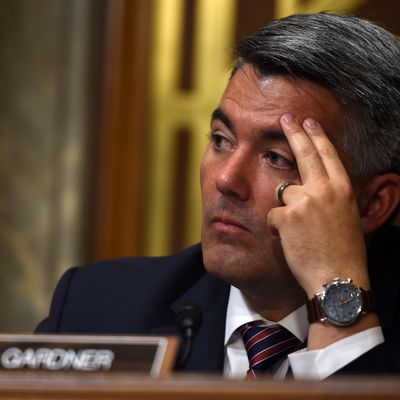
The president used a surprise press appearance today to reiterate his border-wall funding demands, not to further negotiations with congressional Democrats aimed at reopening the federal government. So the shutdown drags on with no end in sight. But there was a notable break in the GOP’s united front in support of Trump’s hard-line stance, as The Hill reports:
Sen. Cory Gardner (R-Colo.), who faces a potentially tough reelection in 2020, says Congress should re-open the federal government, even without a deal on funding President Trump’s border wall.
Gardner is the first Senate Republican to call for ending the partial shutdown even without a deal on Trump’s demand for $5 billion to fund a border wall.
“I think we should pass a continuing resolution to get the government back open. The Senate has done it last Congress, we should do it again today,” he said.
Gardner was joined in his restiveness by Maine senator Susan Collins, who has been criticizing the partial shutdown as unnecessary all along. She appears to be in agreement with the House Democratic move to separate the Homeland Security appropriations from the rest of the federal government’s funding and end the hostage-taking, according to Politico:
Sen. Susan Collins (R-Maine), who wrote one of the spending bills House Democrats will be voting on, said in an interview she’d like to see the president endorse at least part of the plan to reopen the government.
“My goal is to get government reopened as fast as possible. And six of those bills, we’ve got agreements on and so I’d like to see those signed into law,” she said of the non-DHS legislation.
Now in isolation, these indications of rebelliousness from two GOP senators don’t necessarily mean much. Mitch McConnell’s not going to bring up any appropriations measure without Trump’s support, and even if he did, it would only take 41 Republican votes to stop it with a filibuster. More generally, the Democratic takeover of the House will mean much lower odds of partisan Republican legislation going anywhere in this Congress. Who cares if a couple of Senate Republicans defect now and then?
But this could signal a more persistent problem, and one that could affect Senate-only business like Cabinet and judicial nominations. Gardner and Collins hold two of the three most vulnerable Republican Senate seats up in 2020 (the other is held by the newly appointed Martha McSally of Arizona). If they get happy feet often, there could be trouble, particularly if Collins’s sidekick Lisa Murkowski, who broke with Republicans on the Obamacare repeal legislation of 2017 and the Kavanaugh confirmation of 2018, joins the factional fun.
There’s still a decent chance Collins will hang it up in 2020. But that could liberate her even more from her party. In any event, despite his wall-to-border-wall domination of the Republican Party, Trump cannot count on lockstep support in the Senate. John McCain may have passed away, and Jeff Flake and Bob Corker may have retired, but there’s still trouble for Trump in the upper chamber.






























